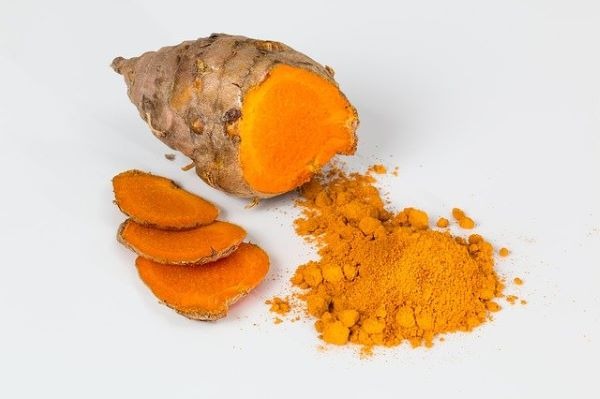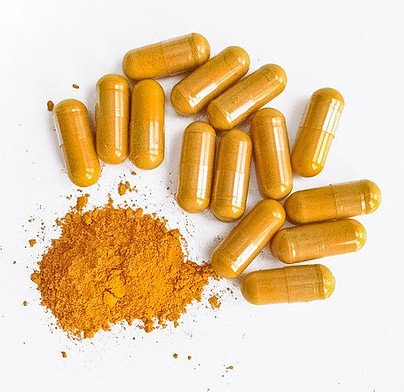So how does turmeric help the brain? It’s best known as the main ingredient in curry powder, but does it have health benefits as well?
Ayurvedic practitioners have been recommending Turmeric for skin conditions, digestive issues, and body pains for more than 6,000 years!
If we dig a bit deeper, we also discover that turmeric has been prescribed for depression and dementia as well.
So how does turmeric help the brain balance itself out? Is it effective enough to be considered a nootropic?
In order to answer these questions, we need to know more about how turmeric influences human health.
Let’s take a closer look…
What is Turmeric? – Where does it come from?
Turmeric is a perennial shrub that grows mainly in southern Asia.
It’s a member of the ginger family, and is cultivated in India, China, Taiwan, Japan, and even some parts of Africa.
Turmeric goes by many names, “Indian Saffron”, and “Yellow Ginger” among them.
However, this pretty little bush is not satisfied with relying just on its’ natural beauty to earn our admiration.
It also has lots of character!
Turmeric Benefits – for General Health
Turmeric has been the subject of countless studies for it’s many health benefits. This is a short list of some of the conditions it can help with:
- Skin problems
- Digestive issues
- Bodily aches and pains(Arthritis & Sports Injuries)
- Stress & Anxiety
- Depression
- Obesity
- Dementia
- Diabetes
- Heart Disease
- Cancer Prevention
Not just a simple herb if you ask me.
And I’m not the only one that feels this way. Turmeric is considered a natural medicine in India, China, Japan, Germany, and several other countries.
The active ingredient in Turmeric that allows it to do all of these wonderful things is curcumin.
Curcumin has been proven to improve blood lipid profiles in humans by lowering cholesterol and blood pressure, as well as preventing the formation of LDL concentration.
Curcumin has also been shown to reduce the formation of amyloid plaques that are closely associated with Alzheimer’s disease.
This is where things get interesting!
Turmeric for Brain Health – The Great Protector!
I think the best place to start is with the neuroprotective effects of curcumin.
Brain inflammation is quite often due to free radical damage. Free radicals are unpaired electrons that are desperate to bond with other molecules.
Kind of like a really drunk party goer at a club looking to hook up with someone, anyone, before the place shuts down.
Not that I would know anything about that. (Ahem…)
This can be caused by an acidic body pH, contaminants in food, and other factors. The problem with free radicals latching onto our bodily tissues is that they cause damage on the molecular level.
Interruptions in RNA or DNA coding can lead to genetic aberrations, in addition to simple tissue damage. This can lead to cancer and a host of other issues.
Fortunately, turmeric is a very potent antioxidant. It acts like a sponge that can soak up free radicals in the body so that they don’t erode the integrity of our cells, including brain cells.
This also makes Turmeric a very effective anti-inflammatory agent.
Stress hormones can also be responsible for a different kind of brain damage.
When people are constantly under stress or anxious, their body gets flooded with hormones like Cortisol.
The brain will become inflamed, and actually start rewiring itself in preparation for a fight-or-flight response.
In other words, the brain cells responsible for automatic reactions start to reproduce more rapidly, and the cells responsible for higher brain function replace themselves at a slower rate.
Simply put: you start becoming more of an ape.
Now, as cute as our ancestral cousins twice removed can be, we do not want to be dropping down a few rungs on the evolutionary ladder just because of stress hormones!
Fortunately, curcumin can counteract this effect by reducing Cortisol levels in the blood, even if the person is stressed.
Turmeric for Depression – A Natural Mood Booster
Which brings us to the issues of depression and dementia.
Turmeric has been prescribed to improve mood and enhance cognition for a very long time. Clinical studies have shed some light on why it has proven effective for both of these issues.
Turmeric indirectly increases levels of dopamine and serotonin in the brain. What do I mean by indirectly?
There are enzymes in the brain that normally break down norepinephrine, dopamine, and serotonin; the 3 neurotransmitters most directly related to issues with depression.
These enzymes are also known as monoamine oxidase (MAO) inhibitors, and curcumin has been shown to block the effects of 2 of these enzymes in clinical trials.
This is how curcumin optimizes dopamine and serotonin levels.
Obviously, keeping dopamine and serotonin in your system will stabilize your mood; these are Nature’s happy pills, after all.
They also help with dementia, memory, and focus.
Which brings us to our next topic of discussion…
Turmeric for Dementia – Cleaning out the Cobwebs!
Turmeric has some other benefits related to neurodegenerative disorders.
Curcumin increases levels of Brain-Derived-Neurotropic-Factor (BDNF), which is a protein that acts as a catalyst for several key reactions in the brain.
BDNF is generally credited with increasing neuroplasticity because it encourages heightened neurotransmitter activity, and facilitates energy metabolism.
Low levels of BDNF are often closely associated with dementia, Alzheimer’s, and Parkinson’s disease.
BDNF also promotes accelerated regrowth of brain cells and neurotransmitter receptors. It’s a pretty impressive little protein!
With all of these impressive benefits turmeric has to offer, you would think the scientific community would be rushing out to conduct more experiments to help establish its’ use as a natural medicine.
Sadly, turmeric only consists of 2-3% curcumin, and curcumin is very poorly absorbed by the human body without help.
Turmeric and Curcumin – Forms, Dosages, & Side Effects
This would seem to render turmeric useless as a natural nootropic, but fortunately there is a solution.
Black pepper has an alkaloid in it called piperine, and when curcumin is taken with piperine, its’ bioavailability is increased by a whopping 2,000%!
Consequently, if you want to benefit from the many benefits of curcumin, I recommend you find the highest quality ‘Certified Organic’ supplement with at least 95% curcuminoids.
This should provide you with some assurance that your supplement is free of pesticides, herbicides, and heavy metals.
Turmeric is also fat soluble, so you can further improve it’s absorption by taking it with a high quality fat like cold pressed coconut oil or olive oil.
And don’t forget that you want to see piperine included in the list of ingredients.
You can find turmeric as a powder, tablet, capsule, tincture, or tea, but I prefer the simplicity of a curcumin extract.
A daily dosage of 500mg to 2,000mg/day is recommended.
A conservative dosage of 500mg/day can be used to start out, and could be increased gradually depending on how you feel.
Turmeric is generally considered very safe. It is a food spice after all! However, when taking concentrated forms of turmeric, you should be somewhat cautious.
Long term use of curcumin supplements can cause nausea, upset stomach, or even ulcers.
If you are diabetic, pregnant, breastfeeding, or using blood thinners, you should consult with your doctor first.
Turmeric can actually be beneficial for diabetics, and it lowers blood pressure, but it’s prudent to speak with your doctor first because they know your medical history.
Final Takeaway – Eat more Curry?
So how does turmeric help the brain? Is it really a nootropic?
I hate to be mysterious about this, but the answer for me is yes, and no.
While eating foods rich in turmeric certainly won’t hurt you, the amount of curcumin in turmeric is so low that the nootropic effects will be minimal.
If you really want to see beneficial health benefits for cognition or your overall health, you’ll need to look at using a curcumin extract.
However, a good curcumin supplement has a lot to offer anyone looking for a simple nootropic that can help with obesity, inflammation, and cleansing the body.
Turmeric is very effective as an overall health profile booster, depending on your concerns.
That’s why I listed all of the general health benefits turmeric is known to be useful for; you could potentially knock out 3 or 4 birds with one stone.
You can simply run through the list, and if there are a few items you can check off that are pain points for you, curcumin could be a great solution for you!
Finally, you can safely take up to 2,000 mg of curcumin extract a day, but most conditions are treated effectively with about 750mg/day.
I might recommend finding a curcumin supplement that has capsules with 300-500mg each so you have some flexibility with your dosing.
Lots of curcumin supplements out there are pretty big horse pills. I would steer clear of them simply so you can avoid choking on the darn things.
That’s about all I had to share with you about turmeric and curcumin. I sincerely hope you found this article informative.
If you have any comments, please post them below, and I will get right back to you!
In my next article, I’ll be looking at the many benefits of supplementing with L-Tyrosine.
Thanks for reading! See you next time!
Michael





WOW! I did not know that turmeric was that good for you. I thought it was just a spice. This one is definitely a must have in the pantry.
Do you think it is better to take pure curcurmin or turmeric? Also, are you a chemist? You seem to know a lot about these things.
Hey Karl,
Thanks for reading my article. Really appreciate your interest!
I would recommend taking curcumin as a supplement. Turmeric is only 3% curcumin, and it’s the curcumin that provides all of the health benefits. Curcumin is also poorly absorbed by the body, so a supplement will get you better results.
Studies have shown that taking curcumin with black pepper will increase it’s absorption by about 2,000%. Curcumin is also fat soluble, so most people take curcumin with a high quality fat. Cold pressed coconut or olive oil usually does the trick.
A good curcumin supplement will have black pepper extract, and possibly a high quality oil included.
I took advanced chemistry courses in high school, and later studied nutritional sciences in college. Thanks for the compliment!
Michael
Hello Michael,
I have come to realize that there are more health benefits to using tumeric than I ever imagined! I didn’t know that it’s a powerful antioxidant that can soak up free radicals in the body so that they don’t errode the integrity of our cells, including brain cells.
Thank you for this awesome post!
Hi Smoochi,
Thanks for reading my post on Turmeric!
Yes, turmeric is best known for treating inflammation, and that includes minimizing oxidative damage from free radicals and/or stress hormones.
It also has some other great properties that make it a very powerful natural nootropic.
Please share this article with a friend! Just click on one of the social media buttons on my site, and you can send it to their Facebook or Twitter account.
Thanks once again for reading, Smoochi!
Michael
Hey Michael,
My wife swears by Turmeric – other than eating an occasional curry dish, I haven’t been up to now a big believer in its’ benefits. You did an outstanding job in your post to convince me to start taking Turmeric.
As I commented on a previous post, I am concerned about getting the proper dosage from a very reliable source.
Is there a particular company that you would recommend?
Hey Steve,
Thanks for reading my article on Turmeric.
Turmeric has a lot of benefits to offer, and if you want to try it out, I really think you should find your own supplement. I am not saying that to brush you off, but there are over 8,000 turmeric supplements on the market.
There are also several different delivery systems. Some supplements are a powder, some are capsules, and I have seen some liquid forms that claim to have better absorption.
It’s kind of a personal choice, and I want you to have the freedom to find a supplement you like, and that you think is the best. Just follow the guidelines in my article, and you’ll find something that works for you.
Thanks once again for your interest.
Michael